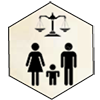Texas Child Custody and Child Support Lawyers
Child custody in Texas
In order to protect your children’s wellbeing, it’s important that you understand your physical custody and legal custody rights. Physical custody refers to your child’s living arrangements, and parental responsibilities related to childcare.
Legal custody is the parental right to make legal decisions regarding your children, such as education, religious upbringing, and health care.
A common custody arrangement may be for one parent to maintain physical custody, but for both parents to share legal custody. In such a case the parent who maintained primary physical custody would receive child support.
The general criteria that the Texas family courts use in weighing custody matters are that:
- Children have frequent and continued contact with parents who have shown they can act in the best interest of their child
- The parent can provide a safe, stable, and non-violent home for the child
- Parents share the rights and duties of raising their child after they have divorced
Unless there are circumstances that put your child at risk, the Texas family courts feel joint custody is in a child’s best interest. An example of this type of custody arrangement could be; one parent having primary custody and the other parent having the child on weekends.
Child support – who pays?
Typically, the parent with whom the child lives with most of the time receives child support. The parent who doesn’t have physical custody, or has physical custody less often, is generally expected to pay child support. The payment amounts of child support are based on the Texas Child Support Guidelines, although applying those guidelines isn’t always as straightforward as it may seem. An experienced Texas child support lawyer can help you understand the guidelines to ensure you’re in compliance with them.
Can visitation be withheld if support isn’t paid?
No court in the state of Texas will deny a parent access to their child based on whether or not child support payments had been made. However, under Texas law, non-payment of child support can have serious consequences. If your financial circumstances have changed or you have another circumstance that has made it difficult to make support payments it’s best to try to work out a modification. Simply stopping the payments will only make the situation worse and cause your child to suffer.
Modifications and enforcements
When a judge issues a divorce decree, he or she will also issue orders concerning child custody and visitation. These orders will stay in place until one of the parties is granted a change in the terms of an order through a petition for modification.
The Law Office of Richardson Brown represents many clients in modification matters, including child support, child custody, and access periods.
Our modification and enforcement attorneys always work to achieve modifications as quickly, efficiently, and cost-effectively as possible, without compromising your rights.
Texas child custody and support lawyers protect your child’s best interests
Child support and custody disputes can be one of the most difficult aspects of a Texas divorce. Work with an experienced Texas child custody and support lawyer to protect your child’s interests, and ensure that you’re in compliance with Texas custody and support laws. To learn how Richardson Brown can help you with your child support or custody issue, contact us or call (972) 832-8058 today to schedule a consultation.
Facing Divorce or Family Challenges?
How Can We Help You?
PRIMARY OFFICE LOCATION
1420 West Exchange Blvd., Ste. 190
Glendover Professional Center, Bldg. C
Allen TX 75013
Phone: 972.832.8058
We have an additional office in Anna, TX
for the convenience of our northern clients.









